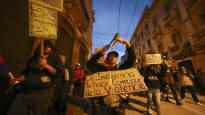Protests are opposed to rising fuel prices.
In South America, Ecuador, the president Guillermo Lasso has declared a state of emergency in three provinces, including the country’s capital. The reason is the violent protests in which indigenous peoples have opposed rising fuel prices.
After declaring a state of emergency, the president can call on the armed forces to maintain order, restrict civil liberties, and declare curfews.
Of Ecuador’s population of more than 17 million, more than one million are indigenous. Ecuador’s indigenous umbrella organization Conaie began anti-government protests earlier this week, which have since been joined by students, workers and other supporters.
Protesters have blocked roads across the country, including highways leading to the capital, Quito. Authorities say more than 40 people have been injured in the violent protests and almost as many have been arrested.
Indigenous Peoples Organization has several requirements
President Lasso held fruitless talks with indigenous leaders on Thursday. The Indigenous Peoples Organization has said it will only open for you once the government has responded to the organisation’s demands.
In addition to the fall in fuel prices, the list of ten demands includes controlling food prices and renegotiating bank loans for millions of local families.
To ease the protests, Lasso announced in his speech late Friday a small increase in the monthly allowance for the poorest in Ecuador. Lasso also introduced a program to help the indebted.
Similar protests were seen a few years ago
Ecuador, an oil-producing country, suffers from inflation, unemployment and poverty. The corona pandemic has exacerbated the country’s problems. The price of fuels in Ecuador has risen sharply since 2020.
The country last saw major fuel demonstrations in 2019 after more than doubling the price of fuel after the then government eliminated fuel tax subsidies. Even then, the Indigenous Organization led protests against price increases. In 2019, at least six people died in protests.
The protests were brought to an end after the Ecuadorian government canceled the cut in fuel tax subsidies, which began
